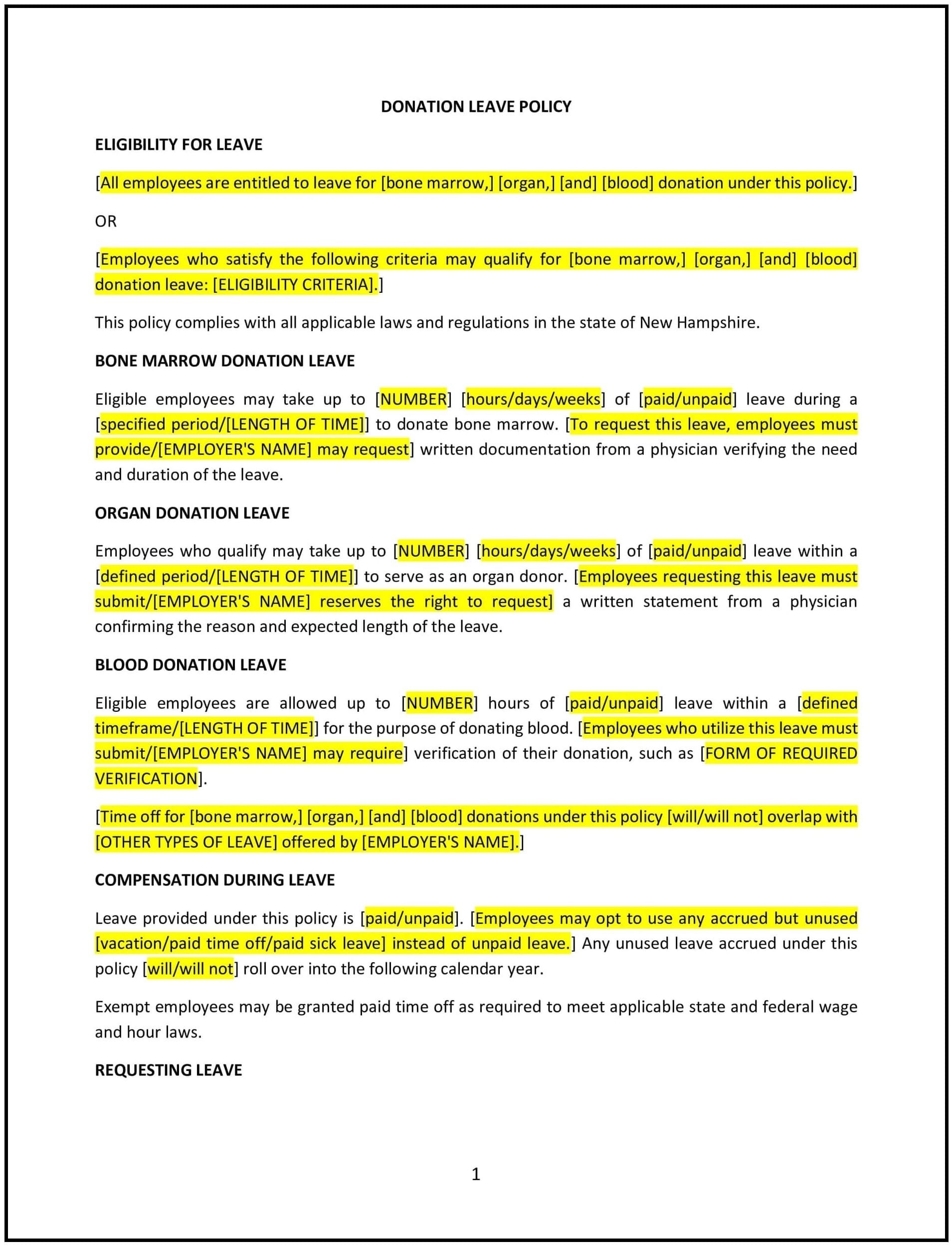Donation leave policy (New Hampshire): Free template
Got contracts to review? While you're here for policies, let Cobrief make contract review effortless—start your free review now.

Customize this template for free
Donation leave policy (New Hampshire)
A donation leave policy helps New Hampshire businesses allow employees to donate their paid time off (PTO) or sick leave to colleagues in need. This policy facilitates an environment of mutual support by enabling employees to contribute to coworkers who are experiencing personal hardships, such as illness or family emergencies.
By adopting this policy, businesses in New Hampshire can strengthen employee morale, promote a supportive workplace culture, and demonstrate a commitment to employee well-being.
How to use this donation leave policy (New Hampshire)
- Define eligibility: Specify who is eligible to donate or receive donation leave, such as full-time employees who have accrued PTO or sick leave and those experiencing qualifying personal hardships.
- Set donation procedures: Outline the process for donating and requesting donation leave, including how employees should submit their requests and how donation leave will be tracked.
- Limit donation leave: Specify the maximum amount of leave that can be donated or received, ensuring that employees are not unduly impacted by donating their time or taking too much leave.
- Ensure transparency: Keep the process transparent by regularly communicating how donation leave works, who can apply for it, and any updates to the program.
- Protect privacy: Respect the privacy of employees who are donating or receiving leave, ensuring that sensitive information regarding personal hardships is shared only with those who need to know.
- Define approval process: Outline who will approve donation leave requests, such as the HR department or a direct supervisor, and specify the timeline for approval.
- Review and update: Regularly review the policy to reflect changes in New Hampshire regulations or company practices, ensuring that the donation leave program remains effective and equitable.
Benefits of using this donation leave policy (New Hampshire)
This policy provides several benefits for New Hampshire businesses:
- Promotes employee support: Enables employees to help colleagues during times of need, fostering a culture of compassion and mutual support.
- Improves employee morale: When employees see that their employer values well-being and fosters a supportive environment, they are more likely to feel engaged and loyal to the company.
- Enhances workplace culture: A donation leave program can strengthen relationships between employees, improving teamwork and collaboration in the workplace.
- Provides flexibility for employees: Allows employees to address personal hardships without the fear of losing income or taking extended unpaid leave.
- Reduces absenteeism: By providing a safety net for employees in times of need, businesses may reduce the likelihood of longer-term absenteeism due to unaddressed personal challenges.
Tips for using this donation leave policy (New Hampshire)
- Communicate the policy clearly: Ensure that all employees are aware of the donation leave policy, understand the donation process, and know how to request donation leave when needed.
- Track donated leave: Maintain accurate records of all donated leave to ensure transparency and fair use of the program.
- Regularly evaluate the program: Monitor the usage and effectiveness of the donation leave program, making adjustments as needed to align with employee needs and company resources.
- Encourage employee participation: Encourage employees to donate leave when they can and emphasize the positive impact it can have on their coworkers.
- Respect privacy: Ensure that all donation leave requests are handled confidentially, especially regarding personal hardships or health-related issues.